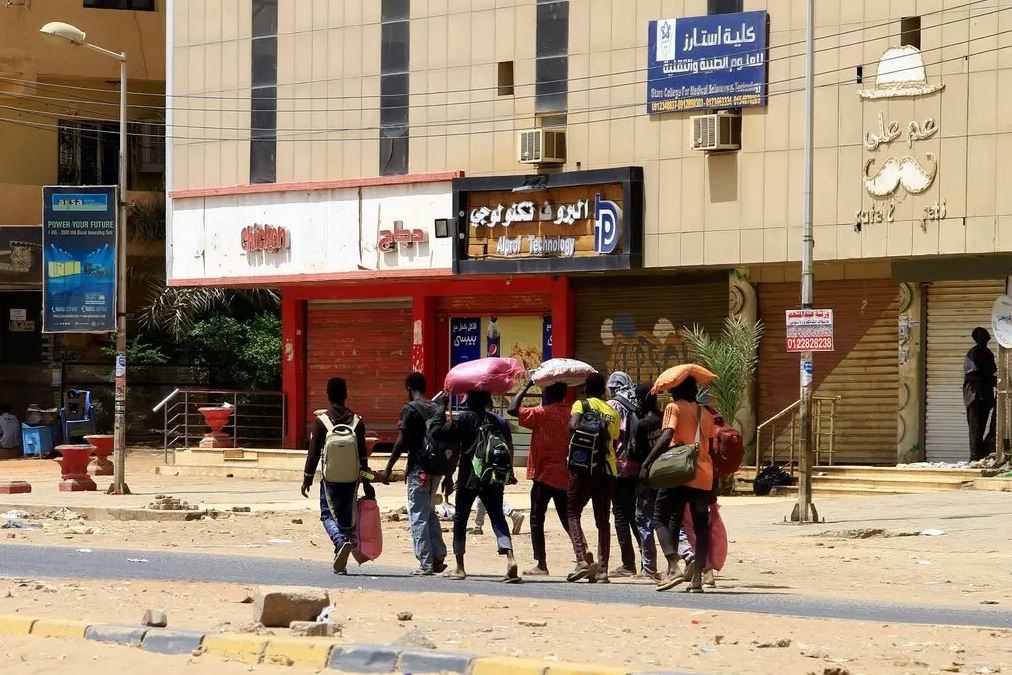Sunday saw the sky above the capital city of Khartoum lit up by fighter planes raining rocket fire down onto a population of millions. The military command centre was reduced to a smoking spire by artillery fire. Passengers on civilian flights at the airport were scared as they cowered on the terminal floors while bombs exploded above.
For four years, the nation has teetered on the brink, holding on to the optimism of the 2019 popular revolution, in which protestors overthrew a harsh tyrant and sparked beautiful aspirations of democracy.
However, Sudan is still ruled by two power-hungry generals. Their violent breakup over the weekend seemed to confirm the worst worries of many when it came to the state of the world today.
Battles broke out in every region as the army and a paramilitary group called the Rapid Support Forces fought for airfields and military posts. The seizure and detention of Egyptian troops and seven Egyptian jets by one of the groups has heightened fears of a wider regional conflict and the possible involvement of Egypt, a major neighbour.
The upheaval is a terrible blow for a country that had just started to emerge from international isolation. Sudan was delisted as a state sponsor of terrorism by the United States after it made slow but steady progress towards democracy. Russian efforts to establish a presence there increased its geostrategic worth, and international help was pledged.
Mr. Farook previously risked his life with tens of thousands of others in 2019 to oppose the dictatorial leadership of Sudan’s President Omar Hassan al-Bashir.
Their aspirations for democracy died this weekend when Mr. Farook and his wife hid inside their home in the Khartoum suburbs in the face of bombings and gunfire.
According to the World Health Organisation, over 83 people have died and over 1,126 have been wounded since April 13. The majority of the casualties occurred over the weekend. Civilians caught in the crossfire are adding to an already high death toll.
According to the United Nations World Food Programme, three of its workers were murdered and one of its aircraft was damaged in the western Darfur area. The organisation has placed an abrupt halt to all operations in Sudan, where 15 million out of the country’s 45 million people are hungry.
The resumption of civilian authority in Sudan was meant to usher in a new era this month. On Tuesday, the fourth anniversary of Mr. al-Bashir’s overthrow, the army reneged on a vow to give up authority. However, this change was contingent on the country’s two top generals, Army Chief General Abdel Fattah al-Burhan and his deputy, Paramilitary Commander Lieutenant General Mohamed Hamdan, putting aside their differences.
Instead, they began fighting, plunging the third biggest nation in Africa into a state of chaos from which it may not emerge until a full-scale civil war has broken out.
Khartoum has captured the world’s attention so far because its citizens have been able to livestream terrifying scenes from the street fights outside their homes without interruption.
Powerful Western and Arab nations, taken aback by the abrupt outbreak of bloodshed early Saturday, ramped up their attempts to convince General al-Burhan and General Hamdan to end the fighting on Sunday.
United in a demand for quick peace negotiations, Secretary of State Antony J. Blinken called with his Saudi and UAE colleagues. Sudan is a member of the Arab League, which has urged both sides to “stop the bloodshed.”
An anonymous source stated that the presidents of Kenya, South Sudan, and Djibouti decided to go to Khartoum together during an emergency meeting of the Intergovernmental Authority on Development, a regional grouping that includes Sudan. Time has not been decided upon.
Rarely since Russia’s invasion of Ukraine last year has the United Nations Security Council issued a statement denouncing the bloodshed and pushing both parties to begin dialogue.
General Hamdan and General al-Burhan went on a verbal assault as their competing forces were exchanging gunfire and rockets in the streets of Sudan. Both men insisted they were the victor, and they made threatening statements that seemed to leave little space for compromise.

